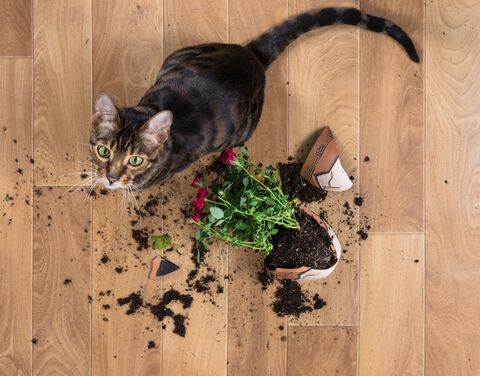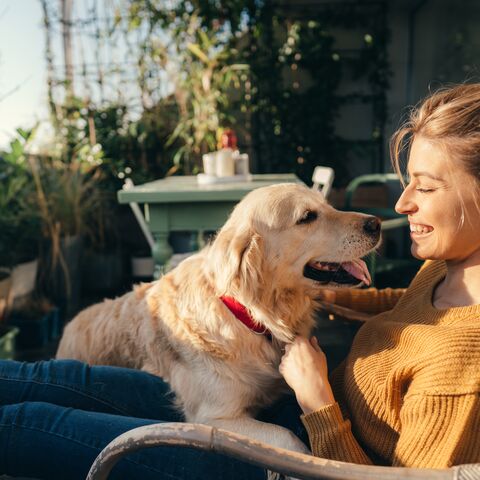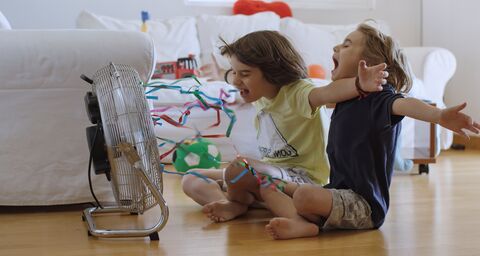
When house pets become a cause of dispute: what you need to know
Do I have to pay if my puppy tears through my neighbor’s garden? Who is liable if my hamster chews through the carpet? And can I bequeath my assets to my parrot? Owning pets is not just all fun, but rather can also entail legal and liability issues.
Our neighbor’s cat likes to do its business in our garden. What can we do about it?
Unlike dog owners, cat owners aren’t normally held liable for their pet’s behavior because cats can’t be constantly supervised. However, there are special water- and sound-based devices that repel cats.
Our elderly neighbor gave our son her cockatoo. Now, eight weeks later, she wants it back. Does my son have to give the cockatoo back to her?
A gift passed from hand to hand cannot be taken back. In this case, the animal has no special standing compared to property.
We inherited my father’s 14-year-old golden retriever, and the dog lives with us in our rented apartment. Our landlord is now threatening to terminate our rental agreement if we don’t send the dog to an animal shelter. Can he do that?
First, you need to check what is stipulated in your rental agreement and/or the house rules. If there are no special rules in this regard, house pets are generally allowed. However, the landlord can refuse his consent to having larger animals like dogs. Your rental agreement can then be terminated if you do not comply.
My daughter’s rabbit had babies. Is it allowed to sell them online?
The sale of pets online is generally permitted. However, a word of caution: As the seller, it is your obligation to ensure that the person who buys the animal(s) does not receive a defective “product.” You would be liable, for example, if you sell a sick rabbit – even if you were unaware that the animal was possibly sick. You can circumvent this obligation by agreeing an exclusion of warranty with the buyer. Here, however, the correct wording is important: stating that the seller does not give any guarantee does not suffice as an exclusion of warranty.
My hamster chewed through the carpet of my rented apartment while it was out of its cage and used the material to build its nest. Do I need to pay the cost of the repair?
As a rule, you as the renter must pay for damage to a rented apartment which you, your pets, or roommates have caused. However, only the remaining present value of the object in question can be charged. The useful life of a carpet is around eight to ten years. If this amount of time has already lapsed, the landlord cannot charge you the cost of replacement. However, if the carpet is new, you must bear the full cost.
As a rule, if your pets damage your rented apartment then you as the renter must pay for the damage.
My aquarium tipped over while I was cleaning it and left a large water spot on the parquet floor. Who is liable for the damage?
In this case, you as the renter are liable. The case would be covered by personal liability insurance since the damage was not caused by the animal, but by the policyholder.
In the summer, my neighbor often places her bird cage with three budgies on her balcony, and they make a lot of noise. Do I just have to live with it?
Generally, a balcony can be used at the discretion of the renter or owner. There are restrictions if it can be assumed that the use will result in excessive (noise) pollution. Whether this is the case is a matter for a judge to decide. Important to know: neighborly disputes that are taken to court can take a long time to resolve and the outcome is uncertain. Especially as the judge has a greater scope for discretion in ruling about what is considered excessive. For this reason, we advise you discuss the issue with your neighbor and try to reach an amicable solution.
Without our knowledge, our 11-year-old son bought a guinea pig from a school friend. Can we give the animal back? Does the purchase amount have to be reimbursed?
An 11-year-old child is not able to have sound judgment when it comes to the purchase of a guinea pig since he cannot gage the consequences such as care and cost. This means the agreement is not valid. You can return the animal and ask for your money back.
Our terrier puppy tore up our neighbor’s kiddie pool. As the owner of the puppy, am I liable for the damage?
Yes. You as the dog owner are liable for the damage your pet caused for the third party, in this case your neighbor. Exception: you are exonerated if you can prove that you attentively cared for and supervised the animal or did everything possible to prevent the damage incurred. In practice, however, this exoneration is very difficult to prove: for example, if a full-grown dog gets onto the neighbor’s property, it is obvious that the pet was not kept on a leash, and thus not everything necessary was done to prevent damage from being caused.
Our daughter would like to have two rats, but our landlord is against it. She lives below us and is afraid of rats. Is she allowed to prohibit us from having the animals as pets?
Small harmless animals such as rats, hamsters, or small birds that can be kept in cages are allowed in rented apartments and do not require the consent of your landlord.
Our cat went “fishing” in our neighbor’s garden pond and caught a Koi carp. Now our neighbor wants us to pay 1,200 francs to compensate for damages. Do I have to pay?
No. Although animal liability also applies to cats, it is less stringent for outdoor cats. Unlike dogs, cats cannot be under constant supervision and cannot be trained to the same extent. It is socially acceptable for cats to roam free, hunt, and mark their territory and recognized that the owners cannot constantly monitor or control them. For these reasons, you as the owner are not liable for the damage your cat causes when it is outdoors.
We bought two chinchillas at a pet shop. I know that they are nocturnal, but the noise is unbearable. Can I take them back?
If there is no right of withdrawal set out in the purchase agreement then it depends on the goodwill of the pet shop. However, many reputable pet shops provide for the option of rescinding the agreement.
Owning small animals as pets is allowed in a rented apartment – you don’t have to ask the landlord for permission.
I ran over my neighbor’s cat. What should I do? What should I keep in mind?
If your neighbor’s cat was injured or killed, then property damage was incurred: according to law, animals are not property, but the provisions applicable to property also apply in this case.
In the event of an accident with property damage, you are liable based on the operational hazard of your vehicle. As the person who caused the accident, you must notify the owner of the cat and provide him or her with your data to cover the damage. If you do not know the owner of the cat then you are obligated to report the incident to the police. Not doing so may in some circumstances lead to criminal proceedings for a hit and run.
It is best to cover the injured animal with a blanket and bring it to the nearest veterinarian or notify an animal rescue service.
The claimant (neighbor) can claim compensation for damage caused by the accident. To calculate the damage, it is not only how much the animal was worth from an economic perspective that matters, but rather also the sentimental value, i.e. what emotional value the animal had for the owner.
My son wants to bury our deceased cat in the garden. Is that allowed?
In this case, it depends on whether you rent the garden or own it. If the garden belongs to you as sole owner then your son may bury the cat there. However, if you only rent the garden, then you must ask your landlord. If you co-own the garden, even if you have special rights of use, then the garden jointly belongs to all relevant parties. In this case, we suggest asking for permission from the other co-owners before burying the deceased pet.
If you inherit a cat or dog, the same provisions apply as with a house or car: ownership and responsibility are transferred to all heirs, unless stipulated otherwise.
My mother passed away, did not leave a will, and has left behind three miniature poodles. Which one of us children has a right to the animals, and/or who must take care of them?
There is no specific rule for animals in the case of inheritance. For this reason, the same provisions apply as with property: the ownership and responsibility pass to the community of heirs. We recommend choosing a person to be responsible for caring for the animals as soon as possible.
My father wants to bequeath his assets to his parrot. Is that allowed?
No, that's not possible. But he can mandate a specific person to care for the animal in his will and allocate a certain amount for this purpose as an inheritance.
I live alone and am the owner of a pug dog, which must be taken out for a walk in the evening. Can my boss require me to work overtime?
If employees cannot or may not bring their dog – or other pets needing walking or care – to work, then the employer must take this into account when allocating working hours or overtime.
According to the Swiss Code of Obligations (SCO), employees can be required to work overtime but only if they are able and it can be reasonably expected in good faith.
A comparison with labor law can be referenced here, according to which employees with family responsibilities may only work overtime when they give their consent.
If a pet falls ill, the employer must make time available for the employee to care for the pet, although not to the same extent as for the care of a sick child, for example.
My Labrador is ill. Can I stay home from work to take the dog to the veterinarian and care for it?
As of April 1, 2003, animals in Switzerland are no longer viewed as property under the law. According to the Animal Welfare Act, you as the owner are obligated to immediately provide appropriate shelter, care, and treatment for your pet in the case of illness.
Under the SCO, your employer is in turn required to pay your salary attributable to a limited period during which you meet these legal obligations, which, through no fault of your own, prevent you from working. This legal position is comparable to that of the obligation to care for a sick child.
However, unlike with caring for a sick child, where you can expect several days off, for a pet you can expect probably only a few hours. Whenever possible, you should try to take care of veterinarian appointments and organize animal shelter before or after work. If, through no fault of your own, you cannot meet your job responsibilities because of your pet then you must submit an attestation, for example,
Can my employer prohibit me from bringing my dog with me to work?
The protection of personal rights in labor law does not usually mean that you can take your dog to work. The situation is different with guide dogs, for example, which employees who are blind or have low vision rely on.
For the employer, this raises the fundamental question of whether or not dogs should be allowed at the workplace. A dog can, under some circumstances, improve the work environment, provided it is well behaved and house-trained. The willingness of employees to work overtime and flexible hours may even increase as a result. However, it must be considered that other employees may be allergic to dogs or be afraid of being bitten by one. Here, the protection of personal rights and equal treatment of employees apply.
My husband and I are separated. Can I demand he pay upkeep for our two horses if divorce proceedings have not commenced?
This can generally be decided in settlement proceedings. If the horse continues to belong to both partners or if both want to use the horses then they must jointly provide for upkeep.
My wife and I bought a bulldog eight years ago. We are now divorcing. Who will be given custody of the dog?
In the case of a dispute, the divorce judge may assign the animal to the party who, in the opinion of the judge, can better care for it. If both partners are in agreement, visitation rights can be arranged.
My partner and I have separated. Who decides who gets our two Labradoodles?
If you cannot reach an agreement – maybe even through mediation – then a judge will decide during settlement or divorce proceedings. If you are not married then the rules of ordinary partnership apply and the decision will be made by a justice of the peace or civil court judge. The party who can provide a better shelter and care from the perspective of animal protection law will get the animal.








